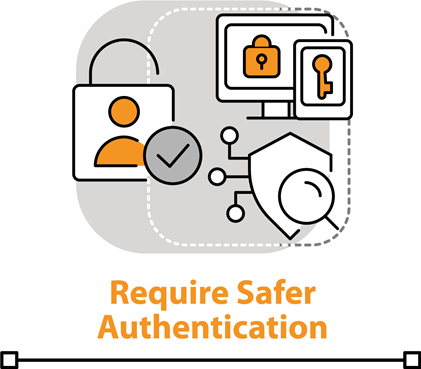For more information on your charming neighborhood CSW Solutions, visit us at our home or subscribe to our newsletter! We also do that social networking thing at: Twitter, Facebook, Linkedin, and Instagram! Check out our #funfactfridays
ADFS vs Azure AD: An Authentication Comparison
Authentication is one of the most important elements of security in any business. It is the process of verifying the identity of a user before allowing them access to a system or service. Authentication ensures that only those who are authorized to access the system can do so, and it is a critical step in protecting the organization's data and resources. There are various methods of authentication, such as passwords, biometrics, and two-factor authentication. Depending on the level of security required, businesses can choose the method to best suit their organizational metrics. By implementing strong authentication systems, businesses can protect their data, resources, and customers, and ensure that their systems remain secure.
Choosing the right authentication provider can be a difficult decision. Both have their own strengths and weaknesses, so it's important to choose the right one for your organization. To help you make the decision, we've put together a comparison of the two most popular services.
In this blog, we will compare and contrast Active Directory Federation Services (AD FS) and Azure Active Directory (Azure AD), authentication solutions for businesses. We will explore their features, capabilities, and use cases to help businesses assess which one is the best fit for their needs and requirements.

What is Azure AD?
Azure AD is a cloud-based identity and access management service from Microsoft. It allows organizations to manage user identities, access control, and security across multiple devices and applications. Azure Active Directory provides a wide range of features and capabilities, including single sign-on, multi-factor authentication, user and group management, and application access control.
Azure AD integrates with on-premises Active Directory and provides single sign-on (SSO) for cloud-based and on-premises applications. Azure AD also provides comprehensive identity and access management (IAM) capabilities, including identity management, access control, and identity protection.
Azure provides a secure, single sign-on portal that allows employees to access the applications they need from any device, whether they are in the office or on the go. With Azure AD, organizations can reduce their IT overhead by eliminating the need for on-premise identity and access management infrastructure. It also allows organizations to control access to their services, ensuring that only authorized users have access. Administrators can easily add new users, set up multi-factor authentication, and manage roles and permissions. These features make it an ideal solution for a wide range of use cases, such as managing access to corporate applications, providing secure remote access, and enforcing data security policies.
Azure Active Directory also integrates with other Microsoft services, such as Office 365, so organizations can manage user identities and access control across their entire cloud environment. Along with many other benefits that continue to be improved and new features being added all the time, Azure AD is an essential tool for any organization looking to streamline identity and access management.
Azure AD is available in two editions: Basic and Premium. Basic Azure AD is included in all Office 365 plans and Azure subscriptions. Premium Azure AD adds additional features, such as Azure AD Connect Health and Azure AD Identity Protection.
Breakdown:
- Allows employees to sign in to multiple services and access them from anywhere via the cloud.
- Requires only one set of sign-in credentials for users logging in on-site or remotely.
- Easily integrates with an existing Windows Server Active Directory.
- Pre-integrated with other cloud services.
- Employs multi-factor authentication and conditional access, improving security and management control.
- Available globally
What is ADFS?
Federated Identity and Access Management (FIAM) is a system that securely shares digital identity and entitlements rights across security and enterprise boundaries. It enables users to have a single sign-on experience, where they can access different services and applications with one set of credentials. This eliminates the need for multiple usernames and passwords, which improves user convenience and security.
Active Directory Federation Services (AD FS) is a core technology that enables FIAM. AD FS provides a secure platform for sharing user credentials and entitlements, while also offering the ability to manage user access rights across multiple applications. It also provides a single sign-on experience for users, making it easier for them to access the services they need. AD FS is an important part of any FIAM system, as it provides the underlying technology for securely sharing digital identity and entitlements across security and enterprise boundaries.
AD FS also provides an extra layer of security, as it requires users to authenticate themselves before being granted access. This ensures that only authorized users can access the applications, reducing the risk of unauthorized access. Additionally, AD FS makes it easier to manage user permissions across multiple applications, as they can be managed in one central location. This makes it easier to keep track of which users have access to which applications, reducing the chance of a security breach.
Breakdown:
- Users navigate to the URL provided by the AD FS service.
- Employs the organization’s AD service to authenticate the user.
- Generates an authentication claim.
- The user’s browser forwards the claim to the target application.

Azure AD or AD FS?
When it comes to deciding between Azure AD vs AD FS for your business, it largely depends on your particular needs and what kind of tiered access you may or may not need. AD FS is a Microsoft identity solution that provides single sign-on (SSO) access to multiple applications and resources. It is a great choice for businesses that have multiple applications and services and need to provide secure access to them.
Azure AD is a cloud-based identity management service from Microsoft. It is best suited for organizations that are 100% cloud-based and need to manage user access to cloud applications or services. Both solutions offer great features and can help your business manage user access effectively. Ultimately, the best solution for your business will depend on your individual needs and identity access requirements.
Final Thoughts
Deploying Azure AD or AD FS can be a daunting task for many organizations. Fortunately, CSW Solutions can provide the expertise and support you need to make sure your deployment goes smoothly. We can provide guidance on architecture and design, as well as help with the actual setup and configuration. No matter what the size or complexity of your project, we have the expertise and experience to make sure it goes as planned.
In addition to deployment services, CSW Solutions provides support with ongoing maintenance and management of your Azure AD or AD FS environment. Whether you need help troubleshooting issues or upgrading your system, our in-house team is available to provide assistance.
No matter what your needs are, CSW Solutions can help you get the most out of Azure AD or AD FS. Contact us today to learn more about how we can help you have a better understanding of who is accessing your data and resources, and monitor the activity of users more closely with a stronger authentication system.
